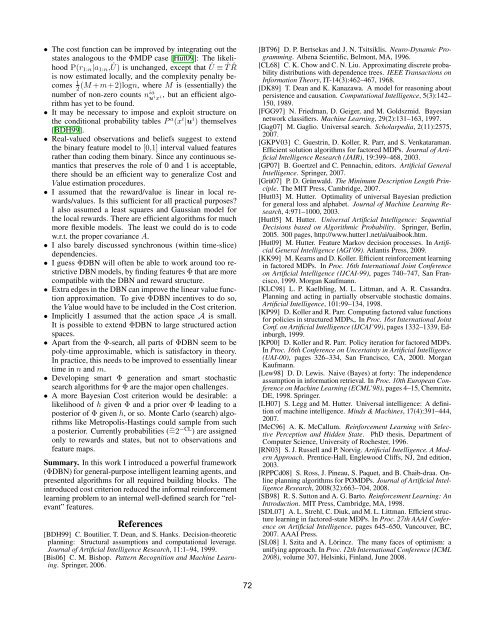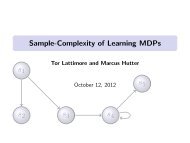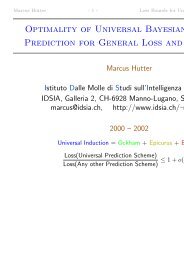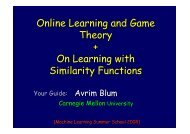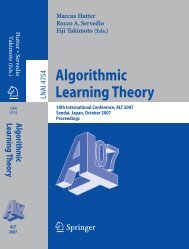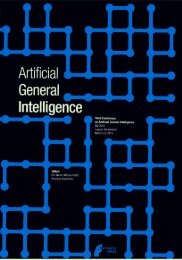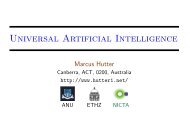A Framework for Evaluating Early-Stage Human - of Marcus Hutter
A Framework for Evaluating Early-Stage Human - of Marcus Hutter
A Framework for Evaluating Early-Stage Human - of Marcus Hutter
You also want an ePaper? Increase the reach of your titles
YUMPU automatically turns print PDFs into web optimized ePapers that Google loves.
• The cost function can be improved by integrating out the<br />
states analogous to the ΦMDP case [Hut09]: The likelihood<br />
P(r1:n|a1:n, Û) is unchanged, except that Û ≡ ˆ T ˆ R<br />
is now estimated locally, and the complexity penalty becomes<br />
1<br />
2 (M +m+2)logn, where M is (essentially) the<br />
number <strong>of</strong> non-zero counts nia uixi, but an efficient algorithm<br />
has yet to be found.<br />
• It may be necessary to impose and exploit structure on<br />
the conditional probability tables P a (xi |ui ) themselves<br />
[BDH99].<br />
• Real-valued observations and beliefs suggest to extend<br />
the binary feature model to [0,1] interval valued features<br />
rather than coding them binary. Since any continuous semantics<br />
that preserves the role <strong>of</strong> 0 and 1 is acceptable,<br />
there should be an efficient way to generalize Cost and<br />
Value estimation procedures.<br />
• I assumed that the reward/value is linear in local rewards/values.<br />
Is this sufficient <strong>for</strong> all practical purposes?<br />
I also assumed a least squares and Gaussian model <strong>for</strong><br />
the local rewards. There are efficient algorithms <strong>for</strong> much<br />
more flexible models. The least we could do is to code<br />
w.r.t. the proper covariance A.<br />
• I also barely discussed synchronous (within time-slice)<br />
dependencies.<br />
• I guess ΦDBN will <strong>of</strong>ten be able to work around too restrictive<br />
DBN models, by finding features Φ that are more<br />
compatible with the DBN and reward structure.<br />
• Extra edges in the DBN can improve the linear value function<br />
approximation. To give ΦDBN incentives to do so,<br />
the Value would have to be included in the Cost criterion.<br />
• Implicitly I assumed that the action space A is small.<br />
It is possible to extend ΦDBN to large structured action<br />
spaces.<br />
• Apart from the Φ-search, all parts <strong>of</strong> ΦDBN seem to be<br />
poly-time approximable, which is satisfactory in theory.<br />
In practice, this needs to be improved to essentially linear<br />
time in n and m.<br />
• Developing smart Φ generation and smart stochastic<br />
search algorithms <strong>for</strong> Φ are the major open challenges.<br />
• A more Bayesian Cost criterion would be desirable: a<br />
likelihood <strong>of</strong> h given Φ and a prior over Φ leading to a<br />
posterior <strong>of</strong> Φ given h, or so. Monte Carlo (search) algorithms<br />
like Metropolis-Hastings could sample from such<br />
a posterior. Currently probabilities (�=2−CL ) are assigned<br />
only to rewards and states, but not to observations and<br />
feature maps.<br />
Summary. In this work I introduced a powerful framework<br />
(ΦDBN) <strong>for</strong> general-purpose intelligent learning agents, and<br />
presented algorithms <strong>for</strong> all required building blocks. The<br />
introduced cost criterion reduced the in<strong>for</strong>mal rein<strong>for</strong>cement<br />
learning problem to an internal well-defined search <strong>for</strong> “relevant”<br />
features.<br />
References<br />
[BDH99] C. Boutilier, T. Dean, and S. Hanks. Decision-theoretic<br />
planning: Structural assumptions and computational leverage.<br />
Journal <strong>of</strong> Artificial Intelligence Research, 11:1–94, 1999.<br />
[Bis06] C. M. Bishop. Pattern Recognition and Machine Learning.<br />
Springer, 2006.<br />
72<br />
[BT96] D. P. Bertsekas and J. N. Tsitsiklis. Neuro-Dynamic Programming.<br />
Athena Scientific, Belmont, MA, 1996.<br />
[CL68] C. K. Chow and C. N. Liu. Approximating discrete probability<br />
distributions with dependence trees. IEEE Transactions on<br />
In<strong>for</strong>mation Theory, IT-14(3):462–467, 1968.<br />
[DK89] T. Dean and K. Kanazawa. A model <strong>for</strong> reasoning about<br />
persistence and causation. Computational Intelligence, 5(3):142–<br />
150, 1989.<br />
[FGG97] N. Friedman, D. Geiger, and M. Goldszmid. Bayesian<br />
network classifiers. Machine Learning, 29(2):131–163, 1997.<br />
[Gag07] M. Gaglio. Universal search. Scholarpedia, 2(11):2575,<br />
2007.<br />
[GKPV03] C. Guestrin, D. Koller, R. Parr, and S. Venkataraman.<br />
Efficient solution algorithms <strong>for</strong> factored MDPs. Journal <strong>of</strong> Artificial<br />
Intelligence Research (JAIR), 19:399–468, 2003.<br />
[GP07] B. Goertzel and C. Pennachin, editors. Artificial General<br />
Intelligence. Springer, 2007.<br />
[Grü07] P. D. Grünwald. The Minimum Description Length Principle.<br />
The MIT Press, Cambridge, 2007.<br />
[Hut03] M. <strong>Hutter</strong>. Optimality <strong>of</strong> universal Bayesian prediction<br />
<strong>for</strong> general loss and alphabet. Journal <strong>of</strong> Machine Learning Research,<br />
4:971–1000, 2003.<br />
[Hut05] M. <strong>Hutter</strong>. Universal Artificial Intelligence: Sequential<br />
Decisions based on Algorithmic Probability. Springer, Berlin,<br />
2005. 300 pages, http://www.hutter1.net/ai/uaibook.htm.<br />
[Hut09] M. <strong>Hutter</strong>. Feature Markov decision processes. In Artificial<br />
General Intelligence (AGI’09). Atlantis Press, 2009.<br />
[KK99] M. Kearns and D. Koller. Efficient rein<strong>for</strong>cement learning<br />
in factored MDPs. In Proc. 16th International Joint Conference<br />
on Artificial Intelligence (IJCAI-99), pages 740–747, San Francisco,<br />
1999. Morgan Kaufmann.<br />
[KLC98] L. P. Kaelbling, M. L. Littman, and A. R. Cassandra.<br />
Planning and acting in partially observable stochastic domains.<br />
Artificial Intelligence, 101:99–134, 1998.<br />
[KP99] D. Koller and R. Parr. Computing factored value functions<br />
<strong>for</strong> policies in structured MDPs,. In Proc. 16st International Joint<br />
Conf. on Artificial Intelligence (IJCAI’99), pages 1332–1339, Edinburgh,<br />
1999.<br />
[KP00] D. Koller and R. Parr. Policy iteration <strong>for</strong> factored MDPs.<br />
In Proc. 16th Conference on Uncertainty in Artificial Intelligence<br />
(UAI-00), pages 326–334, San Francisco, CA, 2000. Morgan<br />
Kaufmann.<br />
[Lew98] D. D. Lewis. Naive (Bayes) at <strong>for</strong>ty: The independence<br />
assumption in in<strong>for</strong>mation retrieval. In Proc. 10th European Conference<br />
on Machine Learning (ECML’98), pages 4–15, Chemnitz,<br />
DE, 1998. Springer.<br />
[LH07] S. Legg and M. <strong>Hutter</strong>. Universal intelligence: A definition<br />
<strong>of</strong> machine intelligence. Minds & Machines, 17(4):391–444,<br />
2007.<br />
[McC96] A. K. McCallum. Rein<strong>for</strong>cement Learning with Selective<br />
Perception and Hidden State. PhD thesis, Department <strong>of</strong><br />
Computer Science, University <strong>of</strong> Rochester, 1996.<br />
[RN03] S. J. Russell and P. Norvig. Artificial Intelligence. A Modern<br />
Approach. Prentice-Hall, Englewood Cliffs, NJ, 2nd edition,<br />
2003.<br />
[RPPCd08] S. Ross, J. Pineau, S. Paquet, and B. Chaib-draa. Online<br />
planning algorithms <strong>for</strong> POMDPs. Journal <strong>of</strong> Artificial Intelligence<br />
Research, 2008(32):663–704, 2008.<br />
[SB98] R. S. Sutton and A. G. Barto. Rein<strong>for</strong>cement Learning: An<br />
Introduction. MIT Press, Cambridge, MA, 1998.<br />
[SDL07] A. L. Strehl, C. Diuk, and M. L. Littman. Efficient structure<br />
learning in factored-state MDPs. In Proc. 27th AAAI Conference<br />
on Artificial Intelligence, pages 645–650, Vancouver, BC,<br />
2007. AAAI Press.<br />
[SL08] I. Szita and A. Lörincz. The many faces <strong>of</strong> optimism: a<br />
unifying approach. In Proc. 12th International Conference (ICML<br />
2008), volume 307, Helsinki, Finland, June 2008.


